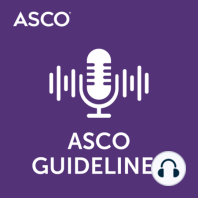15 min listen

Biomarkers for Adjuvant Endocrine and Chemotherapy in Early-Stage Breast Cancer Guideline Update
FromASCO Guidelines
Biomarkers for Adjuvant Endocrine and Chemotherapy in Early-Stage Breast Cancer Guideline Update
FromASCO Guidelines
ratings:
Length:
10 minutes
Released:
Apr 19, 2022
Format:
Podcast episode
Description
An interview with Dr. Fabrice André from Institute Gustave Roussy in Paris, France, and Dr. Komal Jhaveri from Memorial Sloan Kettering Cancer Center in New York, NY, authors on “Biomarkers for Adjuvant Endocrine and Chemotherapy in Early-Stage Breast Cancer: ASCO Guideline Update.” This updated guideline provides precise guidelines on previously endorsed genomic assays and recommendations on the use of new biomarkers to guide endocrine therapy and chemotherapy in patients with ER-positive HER2-negative tumors, and for those with HER2-positive or triple-negative breast cancer. Read the full guideline at www.asco.org/breast-cancer-guidelines. TRANSCRIPT Brittany Harvey: Hello and welcome to the ASCO guidelines podcast series brought to you by the ASCO Podcast Network, a collection of nine programs covering a range of educational and scientific content and offering enriching insight into the world of cancer care. You can find all the shows including this one asco.org/podcasts. My name is Brittany Harvey, and today I'm interviewing Dr. Fabrice André from Institut Gustave Roussy in Paris, France, and Dr. Komal Jhaveri from Memorial Sloan Kettering Cancer Center in New York, NY, authors on “Biomarkers for Adjuvant Endocrine and Chemotherapy in Early-Stage Breast Cancer: ASCO Guideline Update.” Thank you for being here Dr. André and Dr. Jhaveri. Dr. Fabrice André and Dr. Komal Jhaveri: Thank you. Brittany Harvey: First, I'd like to note that ASCO takes great care in the development of guidelines and ensuring that the ASCO conflict of interest policies follow each guideline. The full conflict of interest information for this guideline panel is available online with the publication of the guideline in the Journal of Clinical Oncology. Dr. André, do you have any relevant disclosures that are directly related to this guideline. Dr. Fabrice André: No. Brittany Harvey: Thank you. And Dr. Jhaveri, do you have any relevant disclosures that are related to this guideline topic? Dr. Komal Jhaveri: No. Brittany Harvey: Great, then let's talk about the content of this guideline update. So, Dr. Jhaveri, what prompted the update to the biomarkers for adjuvant endocrine therapy and chemotherapy in early-stage breast cancer, and what is the scope of this guideline update? Dr. Komal Jhaveri: So, since the biomarker guideline published in 2016, there were several new publications that came out between January 2016 and October 2021 that provided perspectives on the use of some of the genomic assays broadly, or specifically in women based on menopausal status, age or number of lymph nodes. Additionally, new biomarkers such as programmed cell death receptor ligand 1 or PD-L1, stromal TILs, circulating tumor DNA, or circulating tumor cells, or new applications, like extended endocrine therapy have also been developed. So, this updated guideline provides precise guidelines on previously endorsed genomic assays and also provides recommendations on the use of new biomarkers to guide endocrine therapy and chemotherapy in ER-positive HER2-negative, HER2-positive, and triple negative breast cancer. Brittany Harvey: Great. Thank you for setting the stage for this guideline. So, then Dr. André, I'd like to review the key recommendations of the guideline for our listeners. So, starting with, which biomarkers should be used to guide decisions on adjuvant endocrine and chemotherapy for patients with newly diagnosed ER-positive HER2-negative breast cancer? Dr. Fabrice André: Thank you. So, when we are focusing on a newly diagnosed patient with ER-positivity HER-2 negative in the context of the question about deciding on chemotherapy. First, the 21 gene recurrence score should be used in patients with node-negative and in patients with 1-3 node positive who are postmenopausal. In premenopausal, this test will be used only in patients with node-negative. The second test that is recommended is the MammaPrint 70-gene signature. And here the recommendation is to use thi
Released:
Apr 19, 2022
Format:
Podcast episode
Titles in the series (100)
Management of Immune-Related Adverse Events Guideline: An interview with Dr. Bryan Schneider of the University of Michigan on the ASCO clinical practice guideline to increase awareness, outline strategies, and offer guidance on the recommended management of immune-related adverse events in patients... by ASCO Guidelines